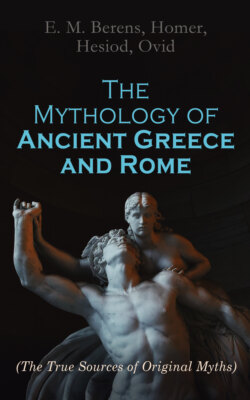Читать книгу The Mythology of Ancient Greece and Rome - Homer - Страница 51
На сайте Литреса книга снята с продажи.
EXPLANATION.
ОглавлениеThe ancient philosophers, unable to comprehend how something could be produced out of nothing, supposed a matter pre-existent to the Earth in its present shape, which afterwards received form and order from some powerful cause. According to them, God was not the Creator, but the Architect of the universe, in ranging and disposing the elements in situations most suitable to their respective qualities. This is the Chaos so often sung of by the poets, and which Hesiod was the first to mention.
It is clear that this system was but a confused and disfigured tradition of the creation of the world, as mentioned by Moses; and thus, beneath these fictions, there lies some faint glimmering of truth. The first two chapters of the book of Genesis will be found to throw considerable light on the foundation of this Mythological system of the world’s formation.
Hesiod, the most ancient of the heathen writers who have enlarged upon this subject, seems to have derived much of his information from the works of Sanchoniatho, who is supposed to have borrowed his ideas concerning Chaos from that passage in the second verse of the first Chapter of Genesis, which mentions the darkness that was spread over the whole universe—‘and darkness was upon the face of the deep’—for he expresses himself almost in those words. Sanchoniatho lived before the Trojan war, and professed to have received his information respecting the original construction of the world from a priest of ‘Jehovah,’ named Jerombaal. He wrote in the Phœnician language; but we have only a translation of his works, by Philo Judæus, which is by many supposed to be spurious. It is, however, very probable, that from him the Greeks borrowed their notions regarding Chaos, which they mingled with fables of their own invention.
